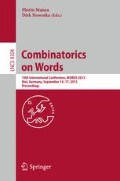Abstract
The square conjecture claims that the number of distinct squares, factors of the form xx, in a word is at most the length of the word. Being associated with it, it is also conjectured that binary words have the largest square density. That is, it is sufficient to solve the square conjecture for words over binary alphabet. We solve this subsidiary conjecture affirmatively, or more strongly, we prove the irrelevance of the alphabet size in solving the square conjecture, as long as the alphabet is not unary. The tools we employ are homomorphisms with which one can convert an arbitrary word into a word with strictly larger square density over an intended alphabet.
F. Manea—His work is in part supported by the DFG grant 596676.
S. Seki—His work is in part supported by the Academy of Finland, Postdoctoral Researcher Grant 13266670/T30606.
Access this chapter
Tax calculation will be finalised at checkout
Purchases are for personal use only
References
Fraenkel, A.S., Simpson, J.: How many squares can a string contain? J. Comb. Theory Ser. A 82, 112–120 (1998)
Ilie, L.: A simple proof that a word of length \(n\) has at most \(2n\) distinct squares. J. Comb. Theory Ser. A 112(1), 163–164 (2005)
Ilie, L.: A note on the number of squares in a word. Theoret. Comput. Sci. 380, 373–376 (2007)
Deza, A., Franek, F., Thierry, A.: How many double squares can a string contain? Discrete Appl. Math. 180, 52–69 (2015)
Deza, A., Franek, F., Jiang, M.: A d-step approach for distinct squares in strings. In: Giancarlo, R., Manzini, G. (eds.) CPM 2011. LNCS, vol. 6661, pp. 77–89. Springer, Heidelberg (2011)
Jonoska, N., Manea, F., Seki, S.: A stronger square conjecture on binary words. In: Geffert, V., Preneel, B., Rovan, B., Štuller, J., Tjoa, A.M. (eds.) SOFSEM 2014. LNCS, vol. 8327, pp. 339–350. Springer, Heidelberg (2014)
Jürgensen, H., Konstantinidis, S.: Codes. In: Rozenberg, G., Salomaa, A. (eds.) Handbook of Formal Languages, vol. 1, pp. 511–607. Springer, Heidelberg (1997)
Acknowledgements
We appreciate fruitful discussions with James Currie at Christian-Albrechts-University of Kiel, with Hideo Bannai and Simon Puglisi at the University of Helsinki, and with Nataša Jonoska when she visited Aalto University.
Author information
Authors and Affiliations
Corresponding author
Editor information
Editors and Affiliations
Rights and permissions
Copyright information
© 2015 Springer International Publishing Switzerland
About this paper
Cite this paper
Manea, F., Seki, S. (2015). Square-Density Increasing Mappings. In: Manea, F., Nowotka, D. (eds) Combinatorics on Words. WORDS 2015. Lecture Notes in Computer Science(), vol 9304. Springer, Cham. https://doi.org/10.1007/978-3-319-23660-5_14
Download citation
DOI: https://doi.org/10.1007/978-3-319-23660-5_14
Published:
Publisher Name: Springer, Cham
Print ISBN: 978-3-319-23659-9
Online ISBN: 978-3-319-23660-5
eBook Packages: Computer ScienceComputer Science (R0)

